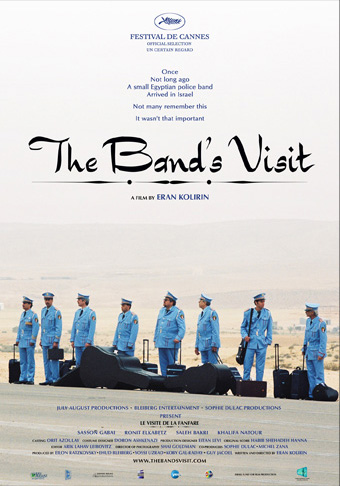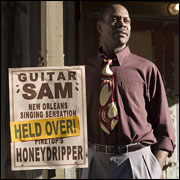It’s official. The cutest thing on the planet is penguins singing “Boogie Wonderland.” Especially if one of them is tap-dancing. This movie is a straight shot of sunshine. I defy anyone to watch it without smiling. Just as important, I defy anyone to watch it without thinking. This is a PG computer-animated film that raises issues from fundamentalism to the environment to bigotry in a manner that is accessible without being heavy-handed, condescending, or overly simplistic.
It begins like a sequel to March of the Penguins. As just about everyone on the planet knows now, the daddy penguins balance the eggs on their feet and huddle together for warmth while the mommies go on a long march to the water to get food to bring back for the new baby chicks. In real life, penguins recognize each other through the unique song each one sings. In this movie, those songs include memorable numbers from the Beach Boys, Freddy Mercury, Prince, and, of course, Elvis.
Norma Jean (voice of Nicole Kidman) sings Prince’s “Kiss.” Memphis (voice of Hugh Jackman) sings Elvis’ “Heartbreak Hotel.” Their eyes meet, their songs entwine, and soon Memphis is shielding the egg from the icy wind. But it rolls away from him and bumps.
Perhaps that is why, when Mumble is born, he is different right from the beginning. He has blue eyes, for one thing. He can’t sing. And he never loses his baby fluff. But he can dance. Boy, can he dance (voice of Elijah Wood, dancing by tap superstar Savion Glover).
Mumbles’ mother is sympathetic and his friend Gloria (voice of Brittany Murphy) is supportive, but his father wants him to conform. The other penguins cast him adrift. He meets up with another breed, Adelies, penguins who are warm and friendly and a little rambunctious. They have a seer named Lovelace (voice of Robin Williams) who wears a necklace made from a plastic six-pack ring.
Mumble returns, but he is rejected by the elders, who blame his non-conformity for the disappearance of the fish they need for food. Mumble finds Lovelace being strangled by the six-pack ring. He believes if he can get Lovelace to the place the ring came from, he can find out what happened to the fish and maybe appeal to the better nature of the “aliens” he thinks must be responsible, maybe he can help to get the fish back and save his community.
The animation is brilliant, making full use of the technology for wild swirls down icecaps and through water. The textures are almost tactile and the scope and perspective are stunning, creating a fully-realized environment that feels perfectly authentic from every angle. Penguins move like loaves of bread with feet, but the animators make them thrillingly distinctive and expressive, and the musical numbers are pure pleasure. In a wise move that adds to its sense of vitality, the animators seamlessly integrate real-life footage for the brief appearances of humans in the film.
But what makes the movie memorable is its story, which has real substance beyond the simple formula of “hero is different/hero is outcast/hero goes on journey/hero saves the day.” It manages to touch on the impact of humans on the environment, the inclination of creatures of all kinds to fear and distrust anything new or different — and to blame it for anything that goes wrong, the importance of having a dream to aspire to and a challenge to struggle against, and the role that songs of all kinds play in our lives and connections. Like a great tune, this movie will resonate within those of all ages as they find their own heartsongs.
Parents should know that there are some moments that may be too intense for younger children, including a predator with a lot of teeth. There are some scary surprises and some moments of peril, including some chases and a hit in the crotch. There is brief potty humor with a little schoolyard language. The issue of environmental degredation and the impact of development on the natural world is raised in a gentle (if simplistic) and positive way.
Families who see this movie should talk about times they felt different or reached out to someone who was different. Families should talk about the people they look up to most to think about how each of them at some time or other felt like an outcast for being different. They should talk about what, if they were penguins, their song would be and why. What, for humans, is the equivalent? What does it mean to appeal to someone’s better nature? They should talk about the importance of asking questions and insisting on answers, and about the risk of blaming innocent people when things go wrong. Why were the penguins in the zoo so dazed when they had everything they needed?
Families should also learn about emperor penguins and about efforts to protect the environment of Antarctica.
Families who enjoy this movie will also enjoy March of the Penguins and some of the classic stories about characters whose differences turned out to be good ones: Ferdinand the Bull to Rudolph the Red-Nosed Reindeer, and The Ugly Duckling. Every family should see Finding Nemo, which has an understated but very sensitive treatment of the “lucky fin” that makes Nemo different. Believe it or not, Cary Grant once starred in a movie about a boy who had a dancing caterpillar named Curly, Once Upon a Time
and some of the classic stories about characters whose differences turned out to be good ones: Ferdinand the Bull to Rudolph the Red-Nosed Reindeer, and The Ugly Duckling. Every family should see Finding Nemo, which has an understated but very sensitive treatment of the “lucky fin” that makes Nemo different. Believe it or not, Cary Grant once starred in a movie about a boy who had a dancing caterpillar named Curly, Once Upon a Time . And the original spectacular combination of pop music, animation, and witty and exciting story is the glorious Yellow Submarine.
. And the original spectacular combination of pop music, animation, and witty and exciting story is the glorious Yellow Submarine.


 Writer-director-editor-actor
Writer-director-editor-actor